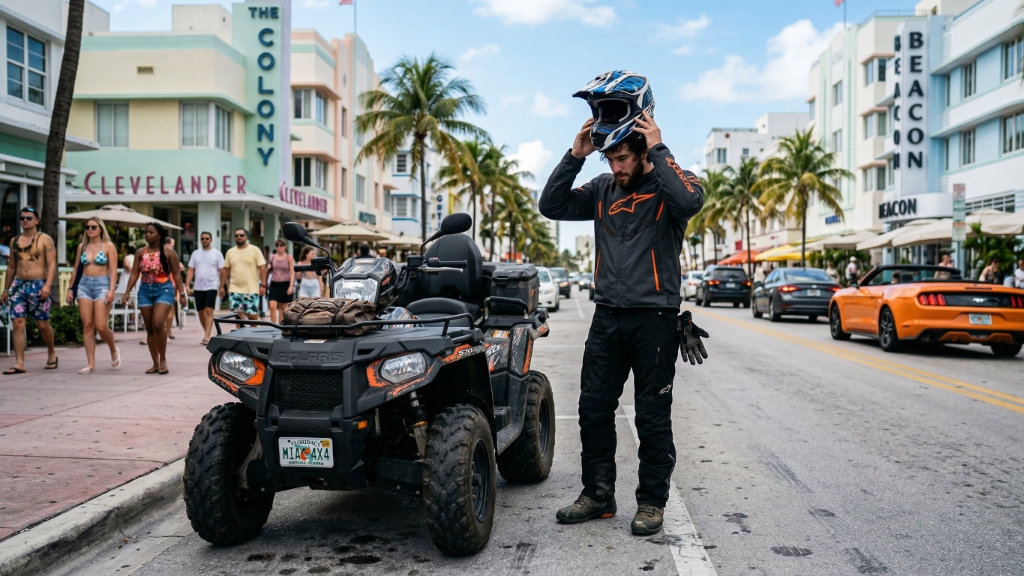We get it. You’ve got that shiny ATV, dirt bike, or off-road vehicle, and you’re itching to take it for a spin—on the streets. It sounds like the perfect combination of adrenaline and convenience, right?
Well, before you rev your engine and take off down the Florida highway, let’s hit the brakes and talk about the rules.
In Florida, the general rule is that off-road vehicles, including all-terrain vehicles (ATVs), are not allowed on public roads, streets, or highways.
But hold on—before you get too disappointed, here’s the plot twist: there are exceptions to this rule.
Yep, you may be able to hit the road in your off-road ride—but only under specific circumstances.
Here’s the breakdown of what you need to know to stay road-ready (and avoid getting towed).
The General Rule:
Let’s start with the basics. According to Florida law, ATVs and other off-road vehicles are typically prohibited from using public roads.
This is to keep things safe—let’s face it, these vehicles aren’t exactly designed for highway speeds or city traffic.
However, Florida doesn’t want to totally rain on your off-road parade, so there are a few exceptions.
Here’s where the fun starts.
When Can You Take Your ATV or Off-Road Vehicle on the Street?
As it turns out, Florida isn’t all about keeping ATVs off the roads forever. There are certain conditions that make it possible for your ride to join the road-ready club. But these exceptions are limited and vary by county and municipality. Here’s what you need to know:
1. Designated Roadways
Local governments can designate specific roads or areas where off-road vehicles are allowed to operate. But don’t go assuming every road is open for business.
The designated streets are typically local routes or rural areas where traffic is lighter, and speed limits are lower.
Think of it as your ATV’s VIP pass—just make sure you know exactly where those roads are before you go for a ride.
2. Lower Speed Limits
If you’re hoping to ride through the city streets, you’ll have to find areas with speed limits that are low enough for your off-road vehicle to safely navigate.
This means you’ll mostly be sticking to backroads or areas where there’s less traffic—your ATV isn’t exactly made for fast lanes and rush hour.
3. Law Enforcement and Government Use
This one’s a little less “fun ride” and more “official business.” ATVs may be allowed on public streets for law enforcement purposes or when used by local governments in certain areas.
So, while it might be cool to see an ATV cop, it’s probably not going to be you cruising down the street on your ride for a leisurely weekend trip.
Stay Informed: Know Your Local Ordinances
While the state lays down the rules, local ordinances can add a whole new layer of complexity. Different counties and municipalities have their own laws about where and how off-road vehicles can be used.
Before you rev your engine and hit the streets, make sure you’re clear on what your area allows. It could mean the difference between a fun ride and a ticket you didn’t see coming.
What’s the Framework?
Florida Statute §316.2074 is the key law that outlines the guidelines for off-road vehicle use on streets. If you want to make sure you’re riding by the book (or avoid accidentally breaking one), it’s a good idea to get familiar with it.
The statute includes specific provisions about vehicle types, road conditions, and local exceptions.

What to Do Next?
Now that you’re a little more knowledgeable about the ins and outs of Florida’s off-road vehicle street laws, it’s time to make sure you’re all set for a road-ready ride. We’ve got your back with these quick steps:
- Check Local Ordinances – See if your local area allows for off-road vehicles on certain roads. Many counties have their own rules, so don’t assume the statewide law applies everywhere.
- Review Florida Statute §316.2074 – It’s always good to know exactly what’s allowed. Take a look at the official document for more detailed info. Read the full statute here.
- Look for Designated Roads – Find out if there are any specific streets in your area where off-road vehicles are allowed. Some cities or counties are more lenient than others.
- Plan Your Ride – If you can hit the streets, make sure you’re in a safe area with appropriate speed limits and low traffic.
Resources for Your Ride
Ready to take your off-road vehicle for a spin on Florida’s roads?
Make sure you’re prepared and know the rules. Check out these resources to stay on track and ride responsibly:
- Florida Statutes – Off-Road Vehicle Use: Get the full breakdown of what’s allowed and when. Click here for details.
- Local Ordinances Lookup: Every county is different, so check your local government website to find out the specifics for your area.
- Florida ATV Safety Information: Want to learn how to safely operate your off-road vehicle? Here’s some important safety info. Read more here.
Ready to hit the road with your off-road vehicle in Florida?
Be sure to check local ordinances and review Florida Statute §316.2074 for the latest guidelines on street use.
Stay compliant, and enjoy your ride!
For full details, visit the official Florida Statutes website.
So, there you have it—Florida’s off-road vehicle rules in a nutshell. While you might not be able to take your ATV on the freeway just yet, there’s still plenty of road ahead for your next off-road adventure.
Just remember: check the rules, stay safe, and make sure your ride stays road-ready!



